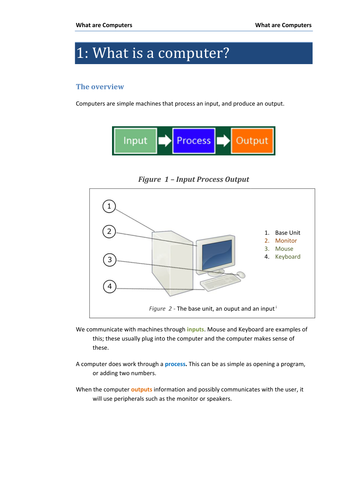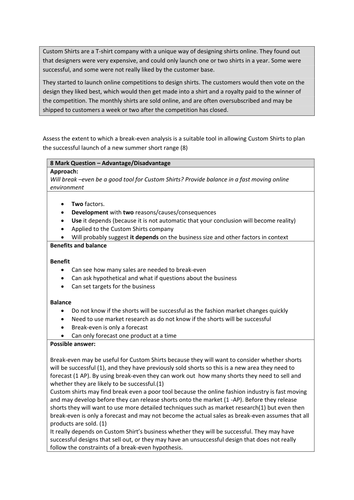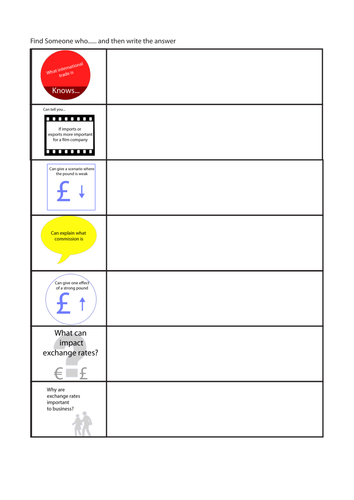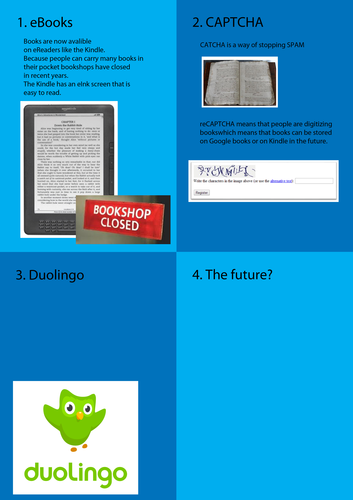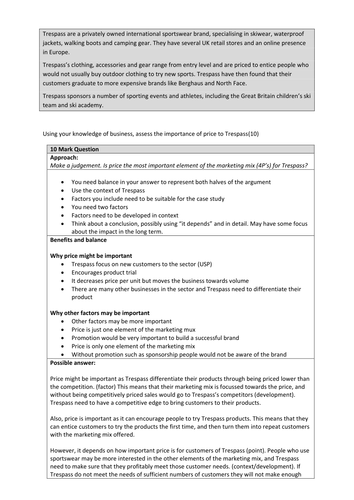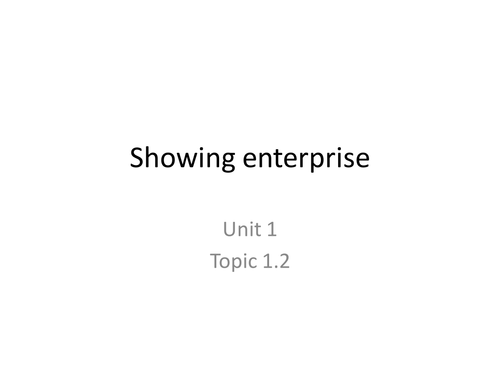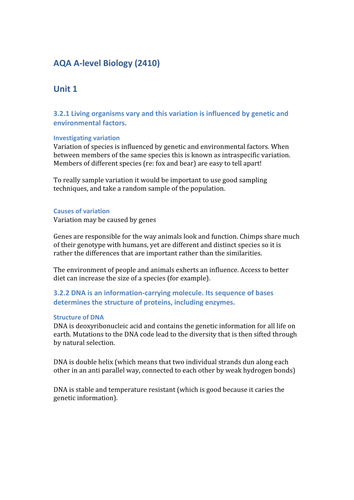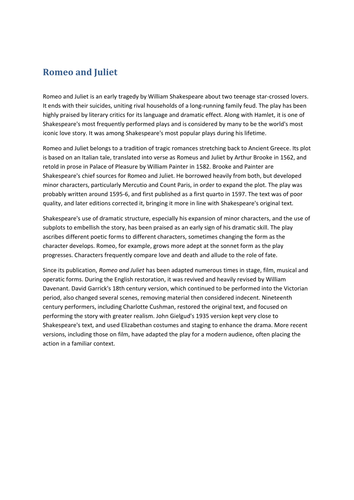
546Uploads
218k+Views
79k+Downloads
All resources

Lists and pointers for AS and A2 Computing
Resources for teaching abstract datatyles (lists) that also leads easily to pointers.
Developed for A level Computing specification.
Not tied to any particular programming language.

Computer Hardware KS3 Worksheet set
Four lessons worth of worksheets for a hardware unit aimed at KS3 students.
Full of activities and fun for your students!

Finance Revision for GCSE Business Studies (Edexcel)
Full lesson for GCSE Business studies revision for the Finance unit (created for Edexcel but suitable for other boards).
Contains presentation, student worksheet, presentation and eight mark question answer. A video accompanies this lesson.
My revision video: https://youtu.be/NY4c-W7FbX8

Exchange rates for GCSE Business Studies
Designed for Unit 1 of Edexcel GCSE Business Studies.
Created for the EDEXCEL specification but will be suitable for other Business Studies qualifications.
Starter Find someone who can.
Exchange rates in the EU worksheet
A notebook exchange rates presentation including a few MCQ at the end.

Computing Algorithms Artificial Intelligence, AI and Crowd Sourcing Lesson for KS3
A single lesson to help students understand crowd sourcing.
We are increasingly using artificial intelligence for simple tasks in the business world. Google use algorithms to digitize books. However there is something quite sinister in the way that Google are using the Crowd to work for them, often with the workers unaware that they are working for a large multinational firm.
This lesson is fully resourced and has a complete teacher’s guide. (L2Answers.docx)
There is a full lesson (L2AI2016edc.docx), and a shortened poster lesson (L2AI2016dc.docx)

Marketing revision for GCSE Business Studies (Edexcel)
Full session for GCSE Business Studies for Edexcel. Includes full worked exam question, activities and videos.
Includes sections on the Marketing mix, product life cycle and pricing.

Showing Enterprise Revision for GCSE Business Studies (Edexcel)
Full revision session for GCSE Business Studies for Edexcel. Includes multiple choice questions, exercises and videos.
https://youtu.be/BwXxr6Gs5yg

GCE AS Level Biology Multiple Choice Questions for Unit 2 for AQA
More than 40 AS Level Biology multiple choice questions.
One copy has no answers, one copy has the correct answer highlighted in bold.
Possible uses include games, revision sessions and so on.

GCE AS Level Biology Unit 2 notes for AQA
GCE AS Level Biology notes written for the AQA specification Biology (2410).
The topics covered in the revision guide are detailed here:
Unit 2
3.2.1 Living organisms vary and this variation is influenced by genetic and environmental factors. Investigating variation
Causes of variation
3.2.2 DNA is an information-carrying molecule. Its sequence of bases determines the structure of proteins, including enzymes. Structure of DNA
Genes and polypeptides
DNA and chromosomes
Meiosis
3.2.3 Similarities and differences in DNA result in genetic diversity. Genetic diversity
3.2.4 The variety of life is extensive and this is reflected in similarities and differences in its biochemical basis and cellular organisation. Haemoglobin
Carbohydrates
Cells
3.2.5 During the cell cycle, genetic information is copied and passed to genetically identical daughter cells. Replication of DNA
Mitosis
Cell cycle
3.2.6 In complex multicellular organisms, cells are organised into tissues, tissues into organs and organs into systems. Cell differentiation
3.2.7 Factors such as size and metabolic rate affect the requirements of organisms and this gives rise to adaptations such as specialised exchange surfaces and mass transport systems. Size and surface area
Gas exchange
Mass transport
The blood system
The passage of water through a plant
3.2.8 Classification is a means of organising the variety of life based on relationships between organisms and is built round the concept of species. Principles of taxonomy
3.2.9 Originally, classification systems were based on observable features but more recent approaches draw on a wider range of evidence to clarify relationships between organisms. Genetic comparisons
DNA
Proteins
Behaviour
3.2.10 Adaptation and selection are major components of evolution and make a significant contribution to the diversity of living organisms. Antibiotics
Genetic variation in bacteria
3.2.11 Biodiversity may be measured within a habitat. Species diversity
Index of diversity

Induction lesson for Computing Year 7
Ever had the problem that students come into year 7 used to their home computers and how the systems worked at their last school? Perhaps you have set up the machines with a default password and need to get them to change that, but also remember that into the coming weeks and months? This lesson has been created to help you.
WALT
• Understand the computer room rules
• Use an algorithm
WILF
• Access the school network
• Access your user area
• Present the classroom rules

GCSE Biology Multiple choice questions
More than 80 GCSE Biology multiple choice questions.
One copy has no answers, one copy has the correct answer highlighted in bold.
Possible uses include games, revision sessions and so on.

GCE AS Level Business Studies Multiple Choice Questions (Unit 2) for AQA
AS Level Business Studies multiple choice questions.
One copy has no answers, one copy has the correct answer highlighted in bold.
Possible uses include games, revision sessions and so on.

GCSE Citizenship Multiple Choice Questions for OCR (J269 and J029)
GCSE Citizenship Multiple Choice Questions for OCR (J269 and J029)
Almost 200 GCSE Citizenship multiple choice questions. Created for the OCR (J269 and J029) specification.
One copy has no answers, one copy has the correct answer highlighted in bold.
Possible uses include games, revision sessions and so on.

GCE A Level Chemistry Multiple Choice Questions for Unit 5 (AQA board)
GCE A Level Chemistry Multiple Choice Questions for Unit 5 (AQA board)
More than 50 A Level Chemistry multiple choice questions. Created for the AQA (2402) specification.
One copy has no answers, one copy has the correct answer highlighted in bold.
Possible uses include games, revision sessions and so on.

GCE A Level Chemistry Multiple Choice Questions for Unit 4 (AQA board)
GCE A Level Chemistry Multiple Choice Questions for Unit 4 (AQA board)
More than 70 A Level Chemistry multiple choice questions. Created for the AQA (2402) specification.
One copy has no answers, one copy has the correct answer highlighted in bold.
Possible uses include games, revision sessions and so on.

GCSE History Multiple choice questions for AQA History B: Full and Short Courses (9145)
More than 70 GCSE History multiple choice questions.
One copy has no answers, one copy has the correct answer highlighted in bold.
Possible uses include games, revision sessions and so on.

GCE AS Level Chemistry Multiple Choice Questions for Unit 2 (AQA board)
More than 150 AS Level Chemistry multiple choice questions. Created for the AQA (2402) specification.
One copy has no answers, one copy has the correct answer highlighted in bold.
Possible uses include games, revision sessions and so on.

GCSE Music Multiple choice questions
80 GCSE music multiple choice questions.
One copy has no answers, one copy has the correct answer highlighted in bold.
Possible uses include games, revision sessions and so on.


